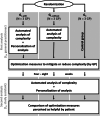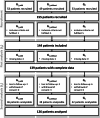HIOPP-6 - a pilot study on the evaluation of an electronic tool to assess and reduce the complexity of drug treatment considering patients' views
- PMID: 35764923
- PMCID: PMC9241250
- DOI: 10.1186/s12875-022-01757-0
HIOPP-6 - a pilot study on the evaluation of an electronic tool to assess and reduce the complexity of drug treatment considering patients' views
Abstract
Background: A complex drug treatment might pose a barrier to safe and reliable drug administration for patients. Therefore, a novel tool automatically analyzes structured medication data for factors possibly contributing to complexity and subsequently personalizes the results by evaluating the relevance of each identified factor for the patient by means of key questions. Hence, tailor-made optimization measures can be proposed.
Methods: In this controlled, prospective, exploratory trial the tool was evaluated with nine general practitioners (GP) in three study groups: In the two intervention groups the tool was applied in a version with (GI_with) and a version without (GI_without) integrated key questions for the personalization of the analysis, while the control group (GC) did not use any tools (routine care). Four to eight weeks after application of the tool, the benefits of the optimization measures to reduce or mitigate complexity of drug treatment were evaluated from the patient perspective.
Results: A total of 126 patients regularly using more than five drugs could be included for analysis. GP suggested 117 optimization measures in GI_with, 83 in GI_without, and 2 in GC. Patients in GI_with were more likely to rate an optimization measure as helpful than patients in GI_without (IRR: 3.5; 95% CI: 1.2-10.3). Thereby, the number of optimization measures recommended by the GP had no significant influence (P = 0.167).
Conclusions: The study suggests that an automated analysis considering patient perspectives results in more helpful optimization measures than an automated analysis alone - a result which should be further assessed in confirmatory studies.
Trial registration: The trial was registered retrospectively at the German Clinical Trials register under DRKS-ID DRKS00025257 (17/05/2021).
Keywords: Complexity factor; Drug treatment; General practice; Patient-centered care; Shared decision making.
© 2022. The Author(s).
Conflict of interest statement
The study was funded by the Innovation Fund of The Federal Joint Committee under Grant number 01VSF16019 (HIOPP-6). In addition, PK-K reports grants from the Federal Ministry of Health and JS reports holding stock of the aQua Institute during the conduct of the study. VSW, SJS, AL, SB, ADM, EF, MM, SW, AM, BB, AA, LS, JS, FP-K, PK-K, PAT, HMS and WEH report no further conflicts of interest regarding this work.
Figures



References
-
- McDonald MV, Feldman PH, Barron-Vaya Y, Peng TR, Sridharan S, Pezzin LE. Outcomes of clinical decision support (CDS) and correlates of CDS use for home care patients with high medication regimen complexity: a randomized trial. J Eval Clin Pract. 2016;22(1):10–19. doi: 10.1111/jep.12383. - DOI - PMC - PubMed
Publication types
MeSH terms
Substances
LinkOut - more resources
Full Text Sources
Miscellaneous
